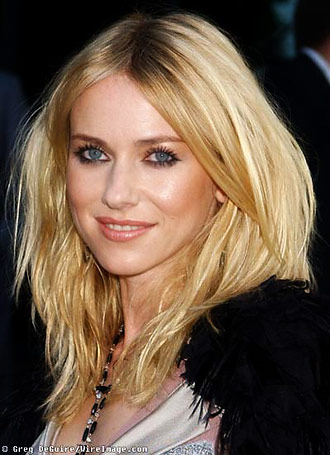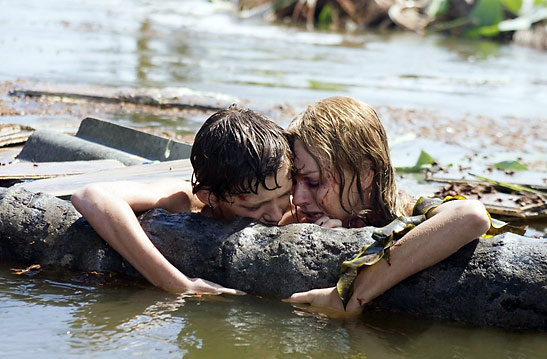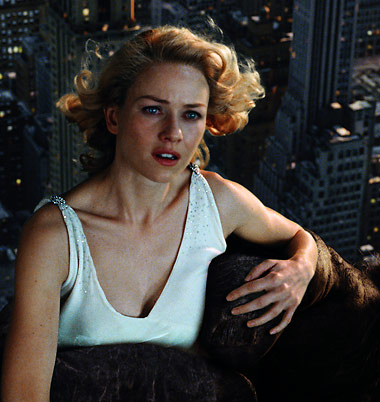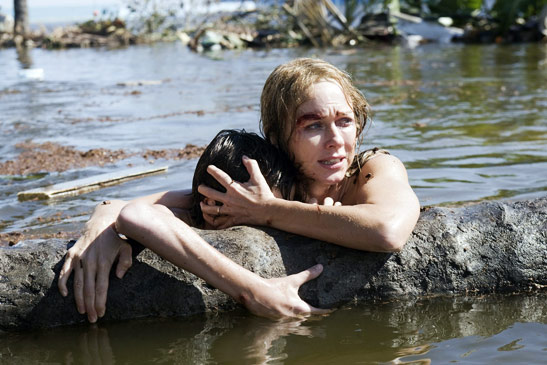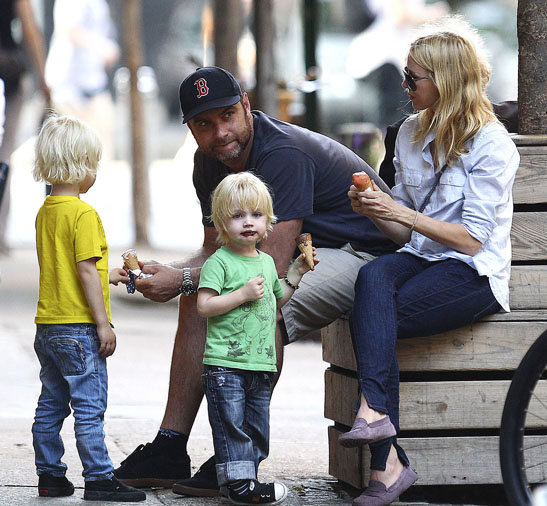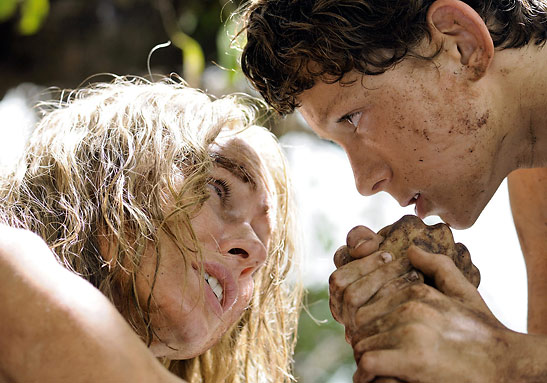 |
 |
|
 |

|
Naomi Watts on
Filming
"The Impossible" Beverly Cohn Entertainment Editor The Road to Hollywood
Watts recently sat down with a select group of journalists to discuss her experience in making the film as well as what she learned from the woman on whom her character is based and the following has been edited for content and continuity for print purposes. How did you get involved in this project and were you familiar with Mr. Bayona's work? Naomi: My agent called me and said there's script about the tsunami and I was like, really, I don't know. That doesn't sound like such a great idea. This is such a big, powerful story and so many lives were lost and affected. I said it feels wrong to make a movie about that and make it spectacular in some ways and often that's how disaster movies end up. But, then I heard that Juan Antonio was going to direct and I knew "The Orphanage" and knew he was a proper filmmaker. I decided to read it and five pages in, I knew I wanted to do it because it felt really grounded in truth and that's because it was all of their experiences, blow-by-blow, everything that happened to them.
Was this the most physically and emotionally demanding role you've ever played? Naomi: The water was definitely the most difficult and when I wasn't in the water, I was in pain or in a high-pitched emotional place, so it was definitely hands down the hardest thing I've ever done.
Before "The Impossible," I would say "King Kong" was the most physically and emotionally demanding role and I actually remember promising to myself to never to that again. But it's sort of like childbirth. You sort of forget the pain. Do you like being in water? Naomi: I actually have a fear of water because I was caught in a rip tide and nearly drowned in Bali and I wasn't a good swimmer. That was when I was emigrating from England to Australia. Did you sustain any injuries during filming? Naomi: Lots of bruises and scrapes and things like that but what I remember as the thing that physically got me was that I had a horrific cough from the beginning to the end of the water sequences which was six weeks and I think I have permanent respiratory damage. It was one of those hacking coughs and because we were in the water all the time, I couldn't get rid of it no matter what medications I was on. We were also in this sort of dusty place as well. Were you actually in the ocean? Naomi: No. The under water stuff was shot in a tank. How long were you actually in the tank where the water was dragging you along and hitting all the debris? Naomi: There were two tanks – the under water and the above-water tank. That was every day for four weeks.
How did you do that? Naomi: With difficulty. But Tom (Holland, who plays the oldest son) found it to be the most fun a fourteen-year-old could have. (laughter) But apart from being fourteen, and a boy, he's also an acrobat and a proper athlete, so he's set up for that kind of thing. Did you meet the actual mother and what was that like? Naomi: Yes. It was fantastic. Originally, when I met Maria, I was incredibly nervous and didn't know where to begin with that conversation. I just felt like I'm just an actor – you had to live through this extraordinary, horrendous thing, and I don't know where to start. I just remember being very nervous and that any question would seem ridiculous. We sat there in front of each other for about five minutes and she didn't feel the need to speak, and I couldn't, and then she started welling up and the story was told through just a look. I started welling up as well and then we thought let's get on with this. She continued to speak for about three-and-a-half hours and time just went like that and she stayed with me the whole time; I don't mean physically, I mean we were connected. We sent emails back and forth and she would write endless letters about all the details that took place in each new scene. The whole experience was beyond belief, but did she say one thing that stood out in your mind? Naomi: The thing that she talked about was her instinct and her ability to trust herself, which I think we lose so often. I should speak for me. I feel like I'm full of self doubt and second-guessing which is why this story becomes interesting to anyone because you wonder how you would be, or how you would deal with this, and how it would change you forever. Did the question of luck ever come up? Naomi: Oh yes. She puts it down to total luck because there were 250,000 lives lost and so many others affected and all five members of her family lived so it has to be luck, it has to be. She doesn't want to be thought of as heroic in any way, even though to me and others, she would be thought of as heroic, but if there's any suggestion of that, she feels that would be unfair, like we did the right thing and that's why we survived. It was just pure luck. She can't say it any other way.
Did you personalize as far as how this would be if these were your children? Naomi: I think about my children's safety on a daily basis. I'm probably, of the two parents, the more neurotic one definitely. But there needs to be one parent who's a bit freer so there's a good balance. The simple things scare me. The ordinary day-to-day things and this story isn't simple on any scale, but yes, when I'm filming, things that have had meaning in my life automatically end up affecting my work. How did you meet the acting challenge of the hospital scenes where you are lying in bed for quite a long time? Naomi: This is difficult because you worry as an actor that if you're forced into one position physically, that it will limit you and obviously the loss of blood and energy was making her very passive, but it's important to keep the emotion moving and the spirit of the character must keep coming through. Again, getting back to Maria, she spoke about how she wanted to keep humor there. Because she's a doctor and knew how much blood she was losing, she was pretty sure she was going to die, but she wasn't dying until she was dead and so there's a sense of the fighter in her. Is there more pressure when you're creating a character who is real vs. fictional? Naomi: I think it's harder when you're playing real life people – especially when people know them and have their own idea about who that person is. In the case of Diana, the most famous woman in the world, instantly there's a huge pressure. With Maria, there was a different kind of pressure because it didn't matter how I walked and talked and looked because nobody knew of her, but it mattered so much in terms of telling the story in the most truthful way, given the amount of suffering she and her family went through and just using her story as a tiny piece of a much bigger story. The original family is Spanish. Why was it switched to an English family? Naomi: I think it was because Juan Antonio (Bayona, the director) knew how much money he wanted for the movie and it had to be open and more accessible to bigger markets. Was there any point in the film where you had to push yourself to keep going? Naomi: All the water stuff – everything in the water. You know it was day after day after day and each time we would go up the track, it would take a huge amount of resetting, so it was a slow process. Had you been to Thailand before the shoot? Naomi: Yes. I'd been to Thailand a few times before the tsunami.
How did you prepare for those very difficult scenes with Tom? Naomi: Juan Antonio set the stage for Tom and me and we literally had four weeks in rehearsal and did all these bizarre acting exercises, improvisations and just created trust and a bond, because we knew how intimate this relationship becomes and he has to grow up and take care of me, something as a parent you never wish upon a child. It was important that we really trusted each other and cared about each other. He blew me away day after day. He was pushed to the limit. Juan Antonio is not satisfied unless he's seen every single color ten times and then he'll choose how to shape it later, but he had little Tom going in extraordinary places and I kept saying, save it, save it. Of course, I've been doing this a while. (laughs) After the shoot did you experience a change in your outlook or did you just rubber band back to "business as usual?" Naomi: I'd like to think that every film stays with
me and gives me some kind of lesson. I would say Maria, connecting with
her and her story, affected me profoundly as to who she is as a person.
If I met her today, without knowing that she had been through the tsunami,
I think I would be intimated by her and not be able to relate to her
because she's so full of this fearlessness and positivity and life is
great. I'm probably quite cynical and not like that, certainly not all
the time. It just makes her very impressive, knowing what she's been
through and how she thinks and not sweating the small stuff. |
This site is designed and maintained by WYNK Marketing. Send all technical issues to: support@wynkmarketing.com

|











